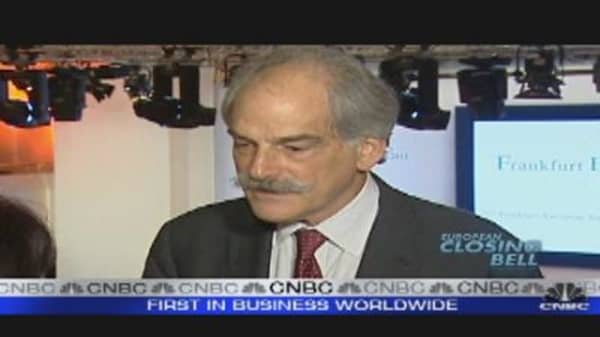The European Central Bank (ECB) should not be used as a lender of last resort to national governments, John Lipsky, the International Monetary Fund’s (IMF) First Deputy Managing Director, said on Friday.
“When you say lender of last resort you have to say lender of last resort to whom? The ECB typically will serve as lender of last resort to the financial system but not to governments and I think that is where there is confusion that comes in,” Lipsky said following the European Banking Congress in Brussels on Friday.
“There is no doubt that the ECB, like any central bank, needs to be allowed to act as a lender of last resort to its financial system, it is not so clear that that’s a good idea to [be] a lender of last resort to governments, in the past that has tended to lead to very bad outcomes.
“Once again there needs to be resources to stand behind the system to provide the firewall to build investor confidence about the stability and sustainability of finances in the euro zone. There are many ways those funds can get raised. Eventually governments are going to have to stand behind them and one of the positive aspects is Europe’s international partners have also been willing to put funds at work to help support that process,“ he added.
Lipsky's comments will be seen as giving substantially backing to German Chancellor Angela Merkel’s position on what has rapidly become an issue which has threatened to put Britain and Germany at loggerheads over a widening debate on the future of the European Union.
Earlier on Friday, British Prime Minister David Cameron visited Berlin for discussions with Merkel over the future of the European Union and possible solutions to the euro zone debt crisis.
Merkel is keen to introduce a new European Union treaty or at the very least some treaty changes.
Cameron’s position is that the euro zone debt crisis must be resolved before any treaty changes can be discussed or negotiated and he has previously called for the ECB to be given additional powers to either issue some form of Euro bonds, something Germany is steadfastly opposed to, or to be able to buy more in the way of Sovereign debt.
Following the summit both the Prime Minister and Chancellor tried to put on a united front despite their obvious policy differences.
“The chancellor and I would agree that whatever you call this we need to take decisive action to help stabilize the euro zone," he said, citing the need for strong action on Greece, a rescue fund with "power and punch" and a recapitalisation of European banks, “ Cameron told the press conference.
However Merkel struck a more cautious note. She has come under pressure to support bolder crisis-fighting steps from the European Central Bank (ECB), such as using it as a lender of last resort for the bloc or backstop for the bloc's bailout fund, the so-called European Financial Stability Facility (EFSF).
"The British demand that we use a large amount of firepower to win back credibility for the euro zone is right. But we have to take care that we don't pretend to have powers we don't have. Because the markets will figure out very quickly that this won't work," she said.




